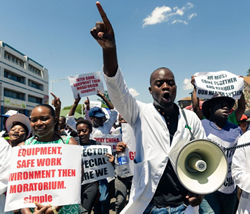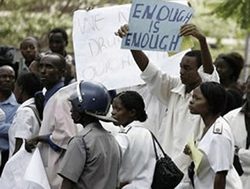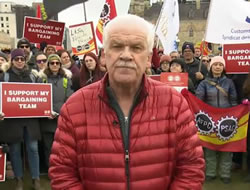 Zimbabwe’s public health workers have gone on strike, claiming they are so poor they can no longer afford transport to their workplaces.
Zimbabwe’s public health workers have gone on strike, claiming they are so poor they can no longer afford transport to their workplaces.
Workers at the Parirenyatwa Group of Hospitals, which is the country’s biggest referral centre, marched to the offices of the Health Service Board within the hospital complex before gathering outside residential hostels for trainee nurses.
The workers said industrial action would continue until their demands for higher salaries were met.
A source, who declined to be named for fear of victimisation, said the lowest-paid employee had been earning $ZWL18,000 ($A81).
“The Government’s award of a 100 per cent increase only takes that employee to $ZWL36,000 plus the $US175 ($A251) in allowances, which does not take that employee anywhere,” the source said.
The Zimbabwe dollar is usually considered to be worthless on international exchanges however, one estimation put $ZWL36,000 at less than $US11.
The Zimbabwe Health Apex Council had notified the public of the strike, claiming the Health Service Board had refused to meet unions since April 2021.
In a statement, the Apex Council said inflation had skyrocketed to more than 130 per cent a year, putting even the best paid health workers below the poverty line.
It said the withdrawal of labour had not been taken lightly.
“We are fully cognisant of the human costs related to any action of this kind but the conditions of service, specifically the remuneration of healthcare workers, are presently so poor that most health workers can no longer afford the service they provide,” the Apex Council said.
“Nor are they able to look after and fend for their families,” it said.
“The decision to withdraw service has only come after repeated efforts to engage the employer, the Health Service Board and the Ministry of Health and Childcare, pleading with them to review the conditions of service of health workers.”
Earlier this month the Government said it would increase workers’ salaries by 100 per cent beginning in July however, it refused a key demand to pay salaries in US dollars.
Harare, 22 June 2022











